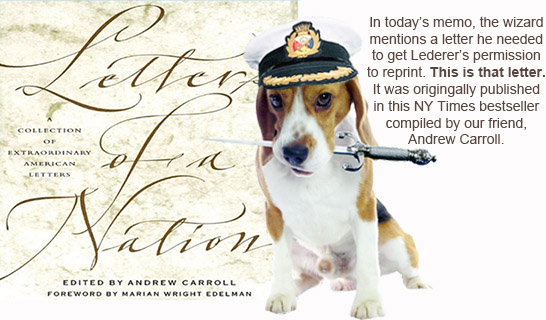William Lederer sent this letter to Admiral David McDonald in Washington. It is a magical letter.
Admiral D.L. McDonald
Chief of Naval Operations
Washington, D.C.
Dear Admiral McDonald,
Eighteen people asked me to write this letter to you. Last year at Christmas time, my wife, three boys and I were in France, on our way from Paris to Nice. For five wretched days everything had gone wrong. Our hotels were “tourist traps,” our rented car broke down; we were all restless and irritable in the crowded car. On Christmas Eve, when we checked into our hotel in Nice, there was no Christmas spirit in our hearts.
It was raining and cold when we went out to eat. We found a drab little restaurant shoddily decorated for the holiday. Only five tables were occupied. There were two German couples, two French families, and an American sailor, by himself. In the corner a piano player listlessly played Christmas music.
I was too tired and miserable to leave. I noticed that the other customers were eating in stony silence. The only person who seemed happy was the American sailor. White eating, he was writing a letter, and a half-smile lighted his face.
My wife ordered our meal in French. The waiter brought us the wrong thing. I scolded my wife for being stupid. The boys defended her, and I felt even worse.
Then, at the table with the French family on our left, the father slapped one of his children for some minor infraction, and the boy began to cry.
On our right, the German wife began berating her husband.
All of us were interrupted by an unpleasant blast of cold air. Through the front door came an old flower woman. She wore a dripping, tattered overcoat, and shuffled in on wet, rundown shoes. She went from one table to the other.
“Flowers, monsieur? Only on franc.”
No one bought any.
Wearily she sat down at a table between the sailor and us. To the waiter she said, “A bowl of soup. I haven’t sold a flower all afternoon.” To the piano play she said hoarsely, “Can you imagine, Joseph, soup on Christmas Eve?”
He pointed to his empty “tipping plate.”
They young sailor finished his meal and got up to leave. Putting on his coat, he walked over to the flower woman’s table.
“Happy Christmas,” he said, smiling and picking out two corsages. “How much are they?”
“Two francs, monsieur.”
Pressing one of the small corsages flat, he put it into the letter he has written, then handed the woman a 20-franc note.
“I don’t have change, monsieur.” She said. “I’ll get some from the waiter.”
“No, ma’am.” Said the sailor, leaning over and kissing the ancient cheek. “This is my Christmas present to you.”
Then he came to our table, holding the other corsage in from of him. “Sire, he said to me, “may I have permission to present these flowers to your beautiful daughter?”
In one quick motion he gave my wife the corsage, wished us a Merry Christmas and departed.
Everyone had stopped eating. Everyone had been watching the sailor. Everyone was silent.
A few seconds later Christmas exploded throughout the restaurant like a bomb.
The old flower woman jumped up, waving the 20-franc note, shouted to the piano player, “Joseph, my Christmas present! And you shall have half so you can have a feast too.”
The piano player began to belt out Good King Wencelaus, beating the keys with magic hands.
My wife waved her corsage in time to the music. She appeared 20 years younger. She began to sing, and our three sons joined her, bellowing with enthusiasm.
“Gut! Gut!” shouted the Germans. They began singing in German.
The waiter embraced the flower woman. Waving their arms, they sand in French.
The Frenchman who had slapped the boy beat rhythm with his fork against a bottle. The lad climbed on his lap, singing in a youthful soprano.
A few hours earlier 18 persons had been spending a miserable evening. It ended up being the happiest, the very best Christmas Eve, they had ever experienced.
This, Admiral McDonald, is what I am writing you about. As the top man in the Navy, you should know about the very special gift that the U.S. Navy gave to my family, to me and to the other people in that French restaurant. Because your young sailor had Christmas spirit in his soul, he released the love and joy that had been smothered within us by anger and disappointment. He gave us Christmas.
Thank you, Sir, very much.
Merry Christmas,
Bill Lederer
